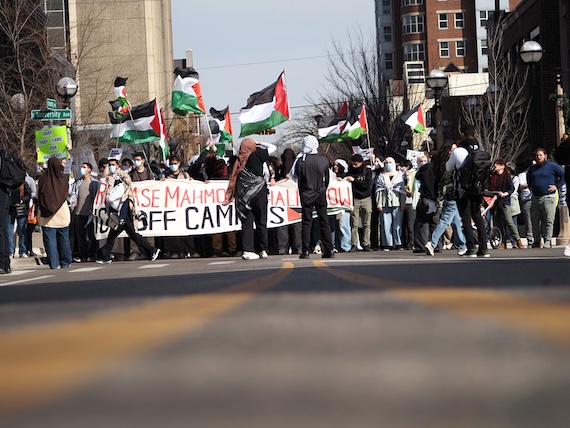( Michigan Advance ) – Former employees of the University of Michigan are suing the leadership of the school, alleging that their employment was terminated after they engaged in pro-Palestinian protests on campus.
The lawsuit, filed Thursday in the U.S. District Court in Detroit by the Sugar Law Center and American-Arab Anti-Discrimination Committee, asserts the university’s actions are in violation with the employees’ constitutional rights of freedom of speech, petition and assembly.
The university attributed all firings and blacklisting to violations of the school’s policies on community violence, but the lawsuit states neither the seven student employees nor the full-time employee who faced repercussions for their participation in protests on campus enacted any sort of violence and complied with police instructions during the events.
Civic engagement has long been a hallmark of the university community, the lawsuit states, noting University of Michigan students throughout history have protested for different causes on campus including demanding an end to the Vietnam War.
But as members of the university community hold protests demanding the university divest from companies tied to Israel’s war in Gaza, the lawsuit states that since the deadly October 7, 2023 Hamas attack on Israel, the university has completely changed its response to protest activity on campus.
“Since October 7, 2023, the University has solely targeted, discriminated against, and punished students for engaging in speech and protest activity in support of Palestine and calling for the University to divest from Israel as a means of pressuring Israel to cease human rights violations against the Palestinian people, including crimes against humanity and genocide,” the lawsuit says.
The lawsuit notes that divestment is a reasonable effort for protesters to pursue as the university has divested before, including divesting from tobacco companies in 2000, South Africa in the 1970’s and 80’s and Russia in 2022. The lawsuit further notes that never before has peaceful participation in protests on the university’s Ann Arbor campus resulted in termination or permanent ineligibility for rehire, as it has for these employees.
University of Michigan spokesperson Kay Jarvis said, “the university does not comment on litigation” in response to Michigan Advance’s request for comment on the lawsuit.
The protests at the heart of the lawsuit are a November 17, 2023 sit-in protest outside the university president’s office and a May 3, 2024 protest outside of the University of Michigan Museum of Art.
During the May 2024 protest, the lawsuit said protestors stood outside the art museum while several of the university’s regents were inside the building for a private event. Protestors linked arms and chanted and moved back to continue their protest after university police set up a barrier around the entrance of the art museum.
Months later, five university employees who participated in the protest were sent correspondence informing them that their employment was terminated and they were permanently not eligible for rehire for violating the university policies against community violence.

Pro-Palestinian protestors gather on University of Michigan’s Ann Arbor campus on March 14, 2025 to call for the release of Columbia University organizer Mahmoud Khalil | Photo: Anna Liz Nichols. Creative Commons license CC BY-NC-ND 4.0.
Four of the individuals who were fired months after the protest were not employees of the university when the protest was held, according to the lawsuit, which added that all the former employees who participated in the November 2023 and May 2024 protests participated in their own personal time.
During the November 2023 protest, the lawsuit says one particular student, Zaynab Elkolaly, attempted to join the sit-in protest outside the university president’s office, entering the Ruthvan Building, when she became caught between a crowd trying to enter the building and police officers at the entrance.
“While turned away from the entrance to leave and with her back to the police, she was grabbed from behind and thrown to the ground by a University of Michigan police officer. While being thrown to the ground, her hijab was ripped off,” the lawsuit says.
Months later, after Elkolaly had graduated and was no longer an employee at the university, but was planning on applying for work at the school, she received a letter from the university saying she was ineligible for rehire due to violating the school’s policies against violence.
“Each of the Plaintiffs was a dedicated University employee who took their job duties seriously, conducted exemplary work, and performed necessary services for the University,” the lawsuit states, adding that the processes the university enacted to terminate employment or bar future employment for the former employees robbed them of due process to combat retaliation by the university for their civic engagement.
The lawsuit seeks to force the university to repeal actions it took against the plaintiffs’ employment statuses, recover damages from loss of employment and any other relief that would be considered just in this scenario.
Published under Creative Commons license CC BY-NC-ND 4.0.


 © 2026 All Rights Reserved
© 2026 All Rights Reserved